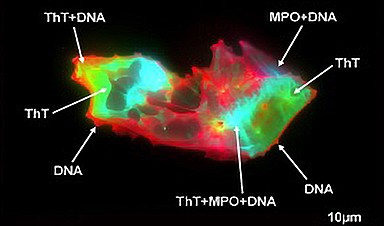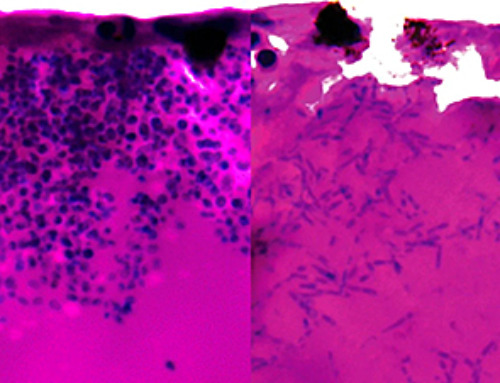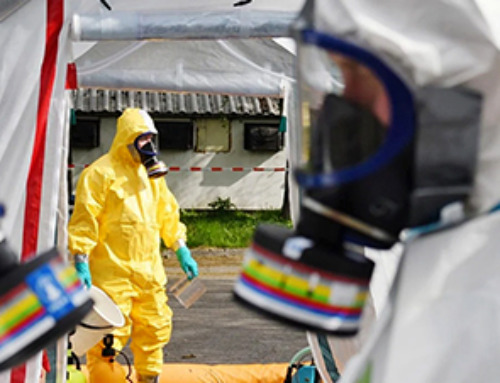Study Shows Those With a Higher Omega-3 Index Are More Protected From Severe COVID Infection
Omega-3 fatty acids, especially EPA and DHA, might be protective against contracting and/or suffering adverse outcomes of COVID-19 infection.
A study just published in the American Journal of Clinical Nutrition (AJCN) explored the role of omega-3 fatty acids, especially EPA and DHA, and whether they might be protective against contracting and/or suffering adverse outcomes of COVID-19 infection.
The study compared the risk for three COVID-19 outcomes: 1-testing positive, 2-hospitalization, and 3-death as a function of baseline plasma DHA levels.
In the fully adjusted models, subjects in quintile 5 (with the highest Omega-3 Index levels) were 21% less likely to test positive than those in quintile 1, and the risk for a positive test was 8% lower for each 1-SD (standard deviation) increase in plasma DHA%. Quintile 5 subjects were also 26% less likely to be hospitalized than those in quintile 1, and risk for hospitalization was 11% lower per 1-SD increase in DHA%.
For death with COVID-19, risk was monotonically lower through quintile 4, but in quintile 5, the risk reduction was partially attenuated and became non-significant. Estimated Omega-3 Index values across the five DHA quintiles ranged from 3.5% (quintile 1) to 8% (quintile 5).
"These values comport well with the Omega-3 Index risk cut points [originally proposed in 2004 for death from cardiovascular disease] of <4% (high risk) and >8% (low risk) and imply that these target levels apply to COVID-19 outcomes as well," researchers noted in their paper.
The investigators also point out that South Korea and Japan have reported an extremely low severity of COVID-19 disease and that although masking practices, social distancing policies and other population-wide interventions no doubt contributed to this, it is interesting to note that the Omega-3 Index values of healthy South Korean and Japanese individuals are about 8-12% and 7–11% respectively, which is much higher compared to an Omega-3 Index of 4-5% in Western populations such as the United States.
"A worldwide pattern linking higher omega-3 fatty acid intakes with lower rates of death with COVID-19 was documented by Vivar-Sierra et al. Although only suggestive, this observation adds further support for a potential role of omega-3s EPA and DHA in the prevention of fatal COVID-19 disease," the researchers said.
"This study confirms previous findings that low omega-3 status is associated with increased risk for hospitalization with COVID-19. We extended these findings by also showing reduced risk for testing positive with the infection and by providing evidence that the risk for death may also be reduced," said Dr. William S. Harris, PhD, FASN, President, Fatty Acid Research Institute (FARI). "Furthermore, we identified the Omega-3 Index levels associated with the least (<4%) and greatest (>8%) protection from COVID-19. Altogether these results support the practice of increasing consumption of oily fish like salmon or omega-3 fish oil supplements as a potential risk reduction strategy when it comes to COVID-19."
Dr. Philip Calder, who wrote an editorial accompanying this publication, said these findings suggest that consuming more long-chain omega-3 fatty acids (EPA and DHA) should be encouraged as a strategy to reduce the impact of the ongoing SARS-CoV-2 pandemic and of future respiratory virus infection outbreaks. Dr. Calder, BSc(Hons), PhD, DPhil, RNutr, FSB, FAfN, is Professor of Nutritional Immunology within Medicine at the University of Southampton, UK.
News
We May Never Know if AI Is Conscious, Says Cambridge Philosopher
As claims about conscious AI grow louder, a Cambridge philosopher argues that we lack the evidence to know whether machines can truly be conscious, let alone morally significant. A philosopher at the University of [...]
AI Helped Scientists Stop a Virus With One Tiny Change
Using AI, researchers identified one tiny molecular interaction that viruses need to infect cells. Disrupting it stopped the virus before infection could begin. Washington State University scientists have uncovered a method to interfere with a key [...]
Deadly Hospital Fungus May Finally Have a Weakness
A deadly, drug-resistant hospital fungus may finally have a weakness—and scientists think they’ve found it. Researchers have identified a genetic process that could open the door to new treatments for a dangerous fungal infection [...]
Fever-Proof Bird Flu Variant Could Fuel the Next Pandemic
Bird flu viruses present a significant risk to humans because they can continue replicating at temperatures higher than a typical fever. Fever is one of the body’s main tools for slowing or stopping viral [...]
What could the future of nanoscience look like?
Society has a lot to thank for nanoscience. From improved health monitoring to reducing the size of electronics, scientists’ ability to delve deeper and better understand chemistry at the nanoscale has opened up numerous [...]
Scientists Melt Cancer’s Hidden “Power Hubs” and Stop Tumor Growth
Researchers discovered that in a rare kidney cancer, RNA builds droplet-like hubs that act as growth control centers inside tumor cells. By engineering a molecular switch to dissolve these hubs, they were able to halt cancer [...]
Platelet-inspired nanoparticles could improve treatment of inflammatory diseases
Scientists have developed platelet-inspired nanoparticles that deliver anti-inflammatory drugs directly to brain-computer interface implants, doubling their effectiveness. Scientists have found a way to improve the performance of brain-computer interface (BCI) electrodes by delivering anti-inflammatory drugs directly [...]
After 150 years, a new chapter in cancer therapy is finally beginning
For decades, researchers have been looking for ways to destroy cancer cells in a targeted manner without further weakening the body. But for many patients whose immune system is severely impaired by chemotherapy or radiation, [...]
Older chemical libraries show promise for fighting resistant strains of COVID-19 virus
SARS‑CoV‑2, the virus that causes COVID-19, continues to mutate, with some newer strains becoming less responsive to current antiviral treatments like Paxlovid. Now, University of California San Diego scientists and an international team of [...]
Lower doses of immunotherapy for skin cancer give better results, study suggests
According to a new study, lower doses of approved immunotherapy for malignant melanoma can give better results against tumors, while reducing side effects. This is reported by researchers at Karolinska Institutet in the Journal of the National [...]
Researchers highlight five pathways through which microplastics can harm the brain
Microplastics could be fueling neurodegenerative diseases like Alzheimer's and Parkinson's, with a new study highlighting five ways microplastics can trigger inflammation and damage in the brain. More than 57 million people live with dementia, [...]
Tiny Metal Nanodots Obliterate Cancer Cells While Largely Sparing Healthy Tissue
Scientists have developed tiny metal-oxide particles that push cancer cells past their stress limits while sparing healthy tissue. An international team led by RMIT University has developed tiny particles called nanodots, crafted from a metallic compound, [...]
Gold Nanoclusters Could Supercharge Quantum Computers
Researchers found that gold “super atoms” can behave like the atoms in top-tier quantum systems—only far easier to scale. These tiny clusters can be customized at the molecular level, offering a powerful, tunable foundation [...]
A single shot of HPV vaccine may be enough to fight cervical cancer, study finds
WASHINGTON -- A single HPV vaccination appears just as effective as two doses at preventing the viral infection that causes cervical cancer, researchers reported Wednesday. HPV, or human papillomavirus, is very common and spread [...]
New technique overcomes technological barrier in 3D brain imaging
Scientists at the Swiss Light Source SLS have succeeded in mapping a piece of brain tissue in 3D at unprecedented resolution using X-rays, non-destructively. The breakthrough overcomes a long-standing technological barrier that had limited [...]
Scientists Uncover Hidden Blood Pattern in Long COVID
Researchers found persistent microclot and NET structures in Long COVID blood that may explain long-lasting symptoms. Researchers examining Long COVID have identified a structural connection between circulating microclots and neutrophil extracellular traps (NETs). The [...]





















